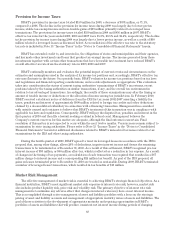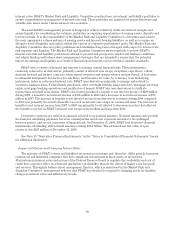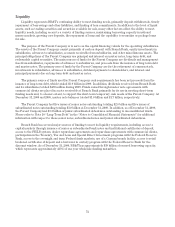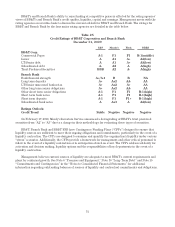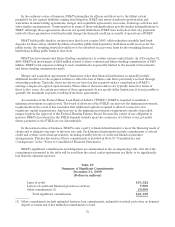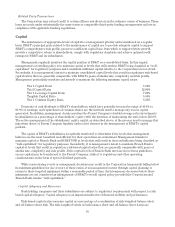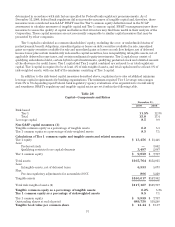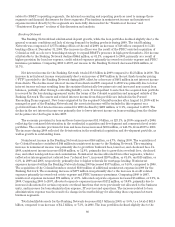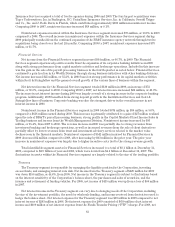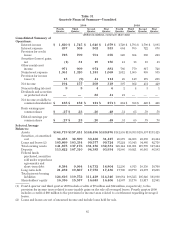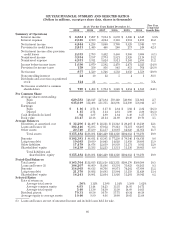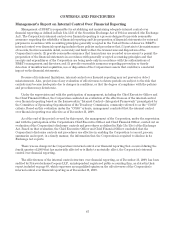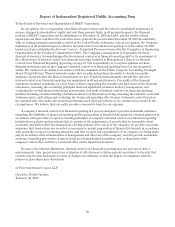BB&T 2009 Annual Report Download - page 78
Download and view the complete annual report
Please find page 78 of the 2009 BB&T annual report below. You can navigate through the pages in the report by either clicking on the pages listed below, or by using the keyword search tool below to find specific information within the annual report.
(1) Tangible common equity and Tier 1 common equity ratios are non-GAAP measures. BB&T uses the Tier 1
common equity definition used in the SCAP assessment to calculate these ratios. BB&T's management uses
these measures to assess the quality of capital and believes that investors may find them useful in their
analysis of the Corporation. These capital measures are not necessarily comparable to similar capital
measures that may be presented by other companies.
(2) Risk-weighted assets are determined based on regulatory capital requirements. Under the regulatory
framework for determining risk-weighted assets each asset class is assigned a risk-weighting of 0%, 20%, 50%
or 100% based on the underlying risk of the specific asset class. In addition, off balance sheet exposures are first
converted to a balance sheet equivalent amount and subsequently assigned to one of the four risk-weightings.
As further described below and reflected in the table, BB&T has entered into a transaction involving the
issuance of capital securities (“Capital Securities”) by a Delaware statutory trust formed by the Company (the
“Trust”). Simultaneously with the closing of this transaction, BB&T entered into a replacement capital covenant
(the “Replacement Capital Covenant”) for the benefit of persons that buy, hold or sell a specified series of long-
term indebtedness of the Company or its largest depository institution subsidiary (the “Specified Debt”). The
Replacement Capital Covenant provides that neither BB&T nor any of its subsidiaries (including the Trust) will
repay, redeem or purchase any of the Capital Securities and the securities held by the Trust (the “Other
Securities”), as applicable, on or before the date specified in the Replacement Capital Covenant, with certain
limited exceptions, except to the extent that, during the 180 days prior to the date of that repayment, redemption
or purchase, the Company has received proceeds from the sale of qualifying securities that (i) have equity-like
characteristics that are the same as, or more equity-like than, the applicable characteristics of the Capital
Securities or Other Securities, as applicable, at the time of repayment, redemption or purchase, and (ii) the
Company has obtained the prior approval of the Federal Reserve Board, if such approval is then required by the
Federal Reserve Board.
The following table identifies the (i) closing date for the transaction, (ii) issuer, (iii) series of Capital
Securities issued, (iv) Other Securities, and (v) applicable Specified Debt.
Closing
Date Issuer Capital Securities Other Securities Specified Debt
6/12/07 BB&T Capital Trust IV
and BB&T Corporation
BB&T Capital Trust
IV’s $600,000,000 Fixed
to Floating Rate Capital
Securities
Company’s $600,010,000
Fixed to Floating Rate
Junior Subordinated
Debentures due 2077
Company’s 6.75% junior
subordinated
debentures due 2036
underlying the 6.75%
capital securities of
BB&T Capital Trust II
Common Stock and Dividends
BB&T’s ability to pay dividends is primarily dependent on earnings from operations, the adequacy of capital
and the availability of liquid assets for distribution. BB&T’s ability to generate liquid assets for distribution is
dependent on the ability of Branch Bank to pay dividends to the Parent Company. The payment of cash dividends
is an integral part of providing a competitive return on shareholders’ investments. The Corporation’s policy is to
accomplish this while retaining sufficient capital to support future growth and to meet regulatory requirements.
BB&T’s common dividend payout ratio, computed by dividing dividends declared per common share by basic
earnings per common share, was 79.31% in 2009 compared to 68.50% in 2008. BB&T’s payout ratio was higher in
2009 due to lower earnings during the economic recession. BB&T’s annual cash dividends declared per common
share declined 50.8% during 2009 to $.92 per common share for the year, compared to $1.87 per common share in
2008. On May 11, 2009, BB&T’s Board of Directors reduced the quarterly cash dividend 68% from $.47 to $.15.
Decreasing the dividend was necessary due to the continuing poor economic conditions and preserves
approximately $725 million of capital per year based on the shares outstanding at the time of the decision. For the
fourth quarter of 2009, BB&T’s common dividend payout ratio was 55.56%. BB&T has paid a cash dividend to
shareholders every year since 1903. A discussion of dividend restrictions is included in Note 16 “Regulatory
Requirements and Other Restrictions” in the “Notes to Consolidated Financial Statements” and in the
“Regulatory Considerations” section.
BB&T’s common stock is traded on the New York Stock Exchange (“NYSE”) under the symbol “BBT”.
BB&T’s common stock was held by approximately 381,000 shareholders at December 31, 2009 compared to
78


